Critical Analysis of Legal Issues in International Sale of Goods
VerifiedAdded on 2022/10/11
|5
|1183
|28
Discussion Board Post
AI Summary
This discussion board post critically examines the legal challenges and issues inherent in the international sale of goods, focusing on the Convention on Contracts for the International Sale of Goods (CISG) and its application. The post delves into the concept of risk, its determination, and its impact on liability, especially regarding the passage of risk from seller to buyer. It highlights key aspects such as offer and acceptance, breach of contract, and available remedies for both buyers and sellers under the CISG. The discussion emphasizes the importance of harmonization and transplantation of international commercial law, while acknowledging the obstacles, such as cultural diversity, that can impede the process. It also examines the role of tribunals and arbitrators in resolving disputes and fostering a global community of courts. The post references relevant articles and websites to support the analysis of the legal issues.
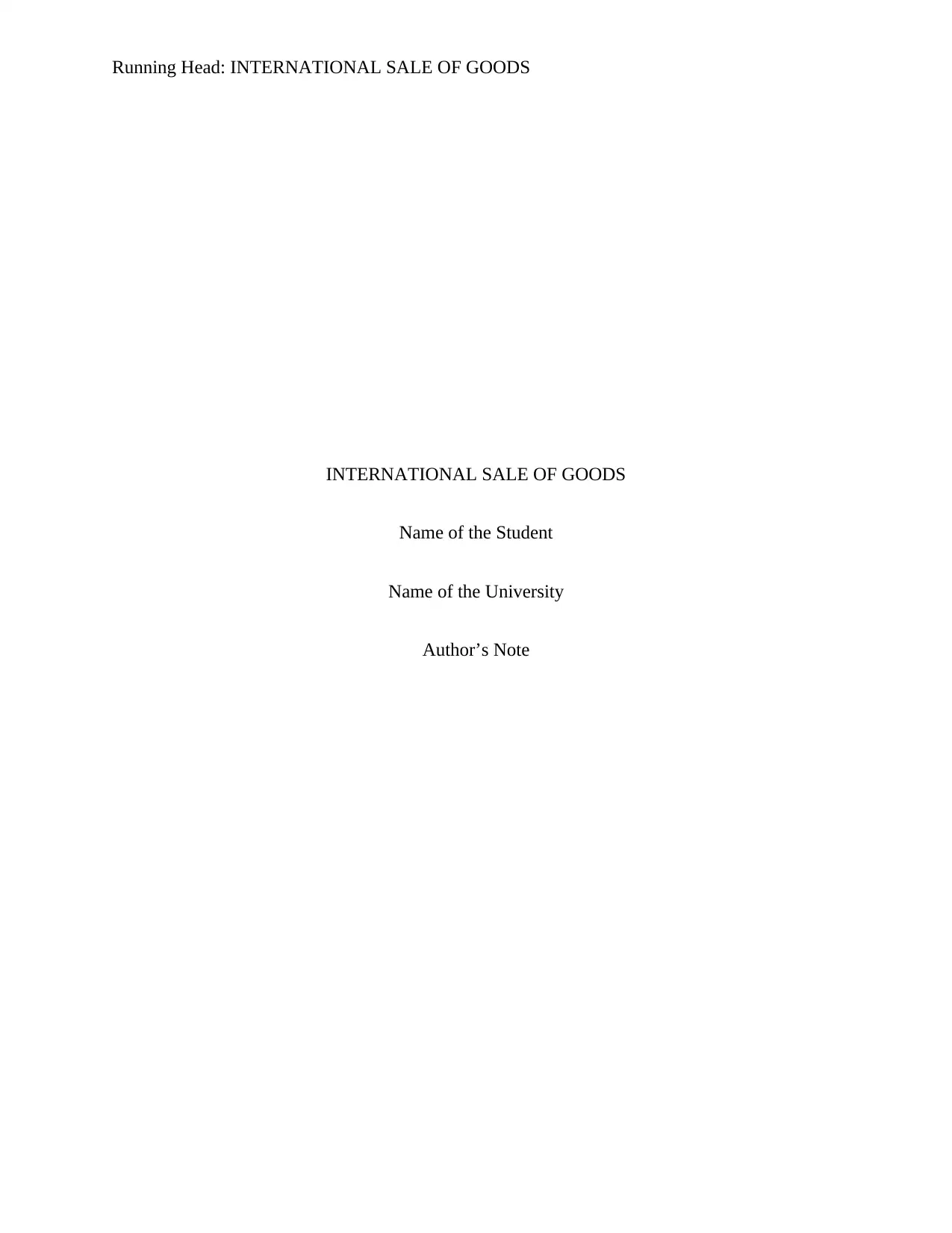
Running Head: INTERNATIONAL SALE OF GOODS
INTERNATIONAL SALE OF GOODS
Name of the Student
Name of the University
Author’s Note
INTERNATIONAL SALE OF GOODS
Name of the Student
Name of the University
Author’s Note
Paraphrase This Document
Need a fresh take? Get an instant paraphrase of this document with our AI Paraphraser
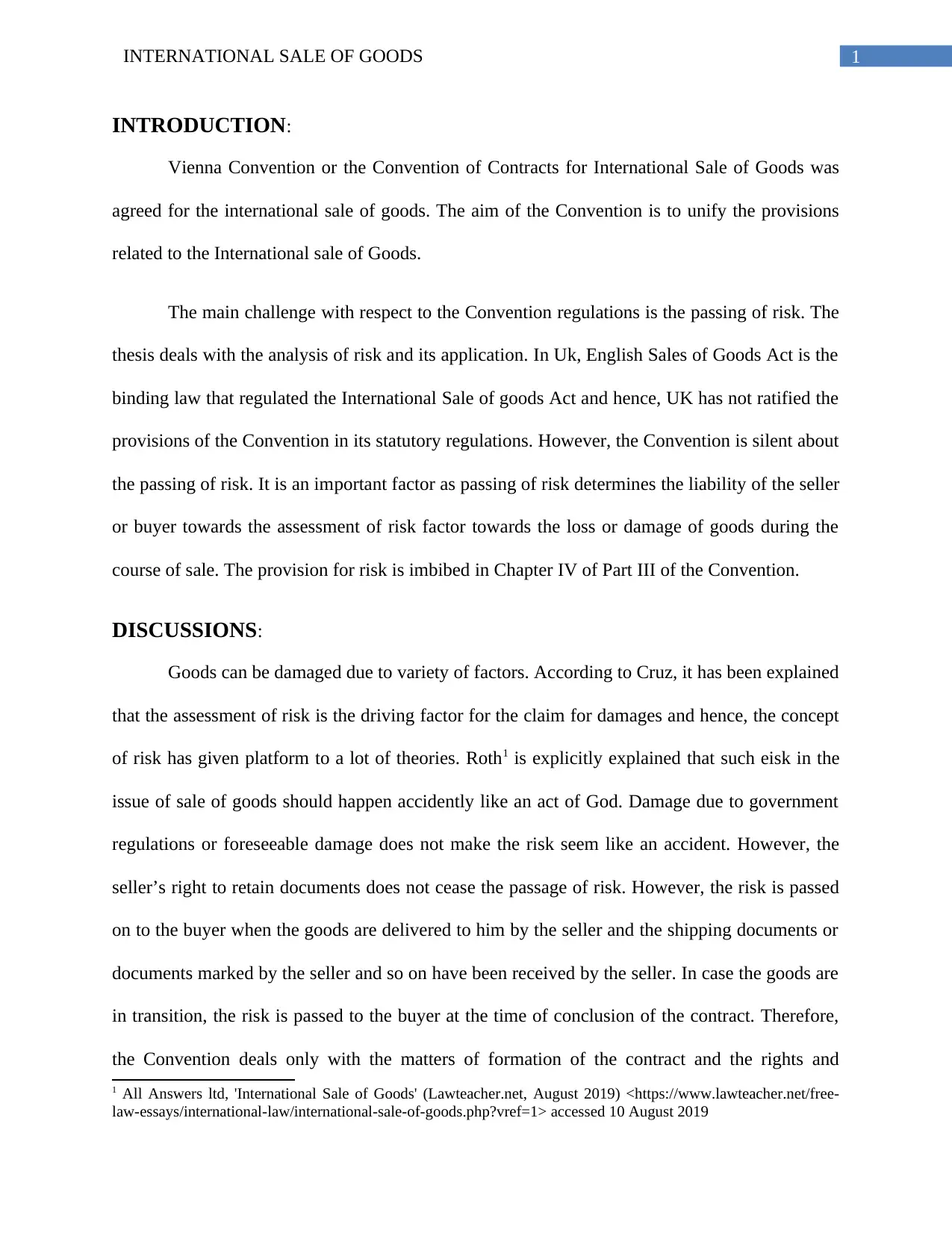
1INTERNATIONAL SALE OF GOODS
INTRODUCTION:
Vienna Convention or the Convention of Contracts for International Sale of Goods was
agreed for the international sale of goods. The aim of the Convention is to unify the provisions
related to the International sale of Goods.
The main challenge with respect to the Convention regulations is the passing of risk. The
thesis deals with the analysis of risk and its application. In Uk, English Sales of Goods Act is the
binding law that regulated the International Sale of goods Act and hence, UK has not ratified the
provisions of the Convention in its statutory regulations. However, the Convention is silent about
the passing of risk. It is an important factor as passing of risk determines the liability of the seller
or buyer towards the assessment of risk factor towards the loss or damage of goods during the
course of sale. The provision for risk is imbibed in Chapter IV of Part III of the Convention.
DISCUSSIONS:
Goods can be damaged due to variety of factors. According to Cruz, it has been explained
that the assessment of risk is the driving factor for the claim for damages and hence, the concept
of risk has given platform to a lot of theories. Roth1 is explicitly explained that such eisk in the
issue of sale of goods should happen accidently like an act of God. Damage due to government
regulations or foreseeable damage does not make the risk seem like an accident. However, the
seller’s right to retain documents does not cease the passage of risk. However, the risk is passed
on to the buyer when the goods are delivered to him by the seller and the shipping documents or
documents marked by the seller and so on have been received by the seller. In case the goods are
in transition, the risk is passed to the buyer at the time of conclusion of the contract. Therefore,
the Convention deals only with the matters of formation of the contract and the rights and
1 All Answers ltd, 'International Sale of Goods' (Lawteacher.net, August 2019) <https://www.lawteacher.net/free-
law-essays/international-law/international-sale-of-goods.php?vref=1> accessed 10 August 2019
INTRODUCTION:
Vienna Convention or the Convention of Contracts for International Sale of Goods was
agreed for the international sale of goods. The aim of the Convention is to unify the provisions
related to the International sale of Goods.
The main challenge with respect to the Convention regulations is the passing of risk. The
thesis deals with the analysis of risk and its application. In Uk, English Sales of Goods Act is the
binding law that regulated the International Sale of goods Act and hence, UK has not ratified the
provisions of the Convention in its statutory regulations. However, the Convention is silent about
the passing of risk. It is an important factor as passing of risk determines the liability of the seller
or buyer towards the assessment of risk factor towards the loss or damage of goods during the
course of sale. The provision for risk is imbibed in Chapter IV of Part III of the Convention.
DISCUSSIONS:
Goods can be damaged due to variety of factors. According to Cruz, it has been explained
that the assessment of risk is the driving factor for the claim for damages and hence, the concept
of risk has given platform to a lot of theories. Roth1 is explicitly explained that such eisk in the
issue of sale of goods should happen accidently like an act of God. Damage due to government
regulations or foreseeable damage does not make the risk seem like an accident. However, the
seller’s right to retain documents does not cease the passage of risk. However, the risk is passed
on to the buyer when the goods are delivered to him by the seller and the shipping documents or
documents marked by the seller and so on have been received by the seller. In case the goods are
in transition, the risk is passed to the buyer at the time of conclusion of the contract. Therefore,
the Convention deals only with the matters of formation of the contract and the rights and
1 All Answers ltd, 'International Sale of Goods' (Lawteacher.net, August 2019) <https://www.lawteacher.net/free-
law-essays/international-law/international-sale-of-goods.php?vref=1> accessed 10 August 2019
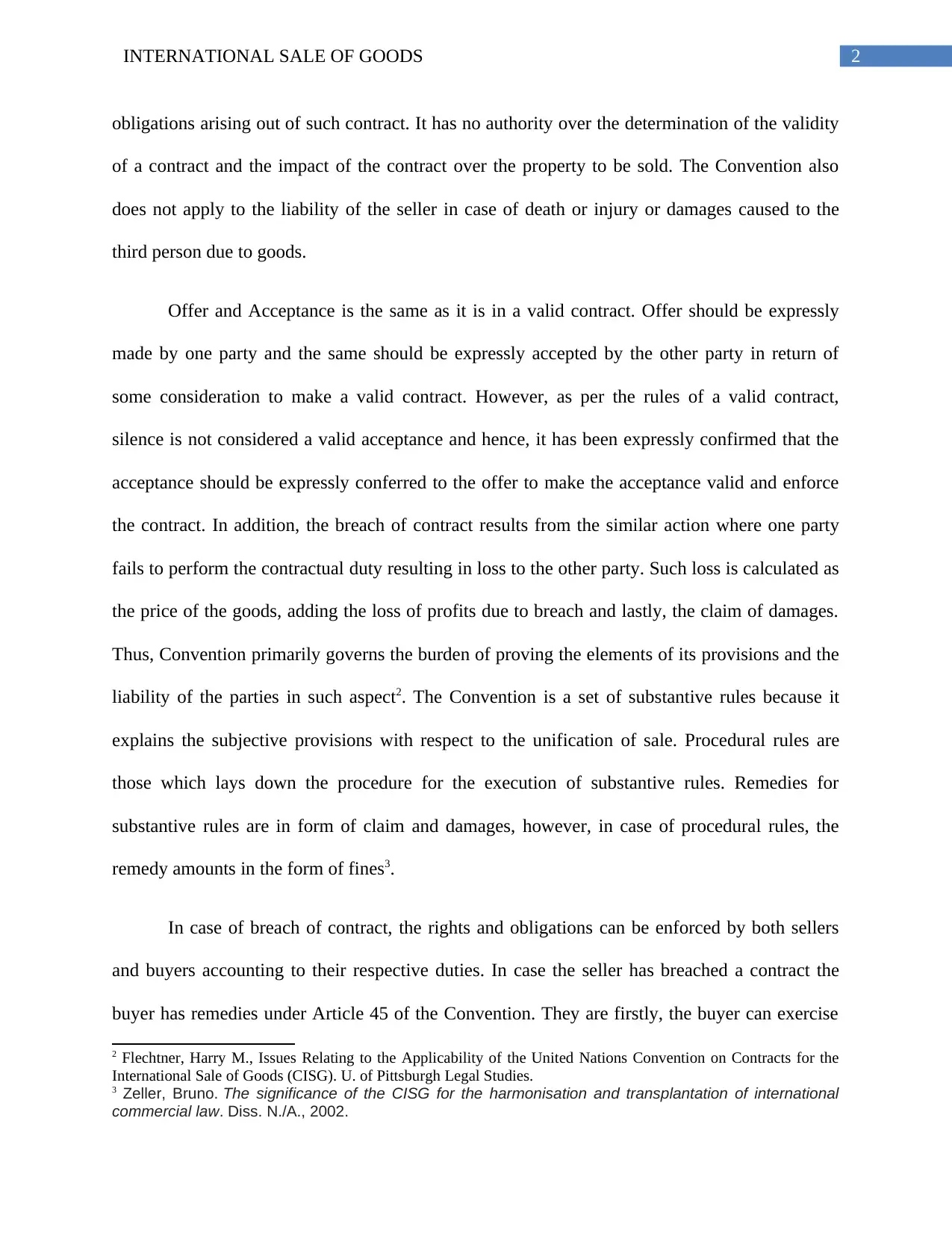
2INTERNATIONAL SALE OF GOODS
obligations arising out of such contract. It has no authority over the determination of the validity
of a contract and the impact of the contract over the property to be sold. The Convention also
does not apply to the liability of the seller in case of death or injury or damages caused to the
third person due to goods.
Offer and Acceptance is the same as it is in a valid contract. Offer should be expressly
made by one party and the same should be expressly accepted by the other party in return of
some consideration to make a valid contract. However, as per the rules of a valid contract,
silence is not considered a valid acceptance and hence, it has been expressly confirmed that the
acceptance should be expressly conferred to the offer to make the acceptance valid and enforce
the contract. In addition, the breach of contract results from the similar action where one party
fails to perform the contractual duty resulting in loss to the other party. Such loss is calculated as
the price of the goods, adding the loss of profits due to breach and lastly, the claim of damages.
Thus, Convention primarily governs the burden of proving the elements of its provisions and the
liability of the parties in such aspect2. The Convention is a set of substantive rules because it
explains the subjective provisions with respect to the unification of sale. Procedural rules are
those which lays down the procedure for the execution of substantive rules. Remedies for
substantive rules are in form of claim and damages, however, in case of procedural rules, the
remedy amounts in the form of fines3.
In case of breach of contract, the rights and obligations can be enforced by both sellers
and buyers accounting to their respective duties. In case the seller has breached a contract the
buyer has remedies under Article 45 of the Convention. They are firstly, the buyer can exercise
2 Flechtner, Harry M., Issues Relating to the Applicability of the United Nations Convention on Contracts for the
International Sale of Goods (CISG). U. of Pittsburgh Legal Studies.
3 Zeller, Bruno. The significance of the CISG for the harmonisation and transplantation of international
commercial law. Diss. N./A., 2002.
obligations arising out of such contract. It has no authority over the determination of the validity
of a contract and the impact of the contract over the property to be sold. The Convention also
does not apply to the liability of the seller in case of death or injury or damages caused to the
third person due to goods.
Offer and Acceptance is the same as it is in a valid contract. Offer should be expressly
made by one party and the same should be expressly accepted by the other party in return of
some consideration to make a valid contract. However, as per the rules of a valid contract,
silence is not considered a valid acceptance and hence, it has been expressly confirmed that the
acceptance should be expressly conferred to the offer to make the acceptance valid and enforce
the contract. In addition, the breach of contract results from the similar action where one party
fails to perform the contractual duty resulting in loss to the other party. Such loss is calculated as
the price of the goods, adding the loss of profits due to breach and lastly, the claim of damages.
Thus, Convention primarily governs the burden of proving the elements of its provisions and the
liability of the parties in such aspect2. The Convention is a set of substantive rules because it
explains the subjective provisions with respect to the unification of sale. Procedural rules are
those which lays down the procedure for the execution of substantive rules. Remedies for
substantive rules are in form of claim and damages, however, in case of procedural rules, the
remedy amounts in the form of fines3.
In case of breach of contract, the rights and obligations can be enforced by both sellers
and buyers accounting to their respective duties. In case the seller has breached a contract the
buyer has remedies under Article 45 of the Convention. They are firstly, the buyer can exercise
2 Flechtner, Harry M., Issues Relating to the Applicability of the United Nations Convention on Contracts for the
International Sale of Goods (CISG). U. of Pittsburgh Legal Studies.
3 Zeller, Bruno. The significance of the CISG for the harmonisation and transplantation of international
commercial law. Diss. N./A., 2002.
⊘ This is a preview!⊘
Do you want full access?
Subscribe today to unlock all pages.

Trusted by 1+ million students worldwide
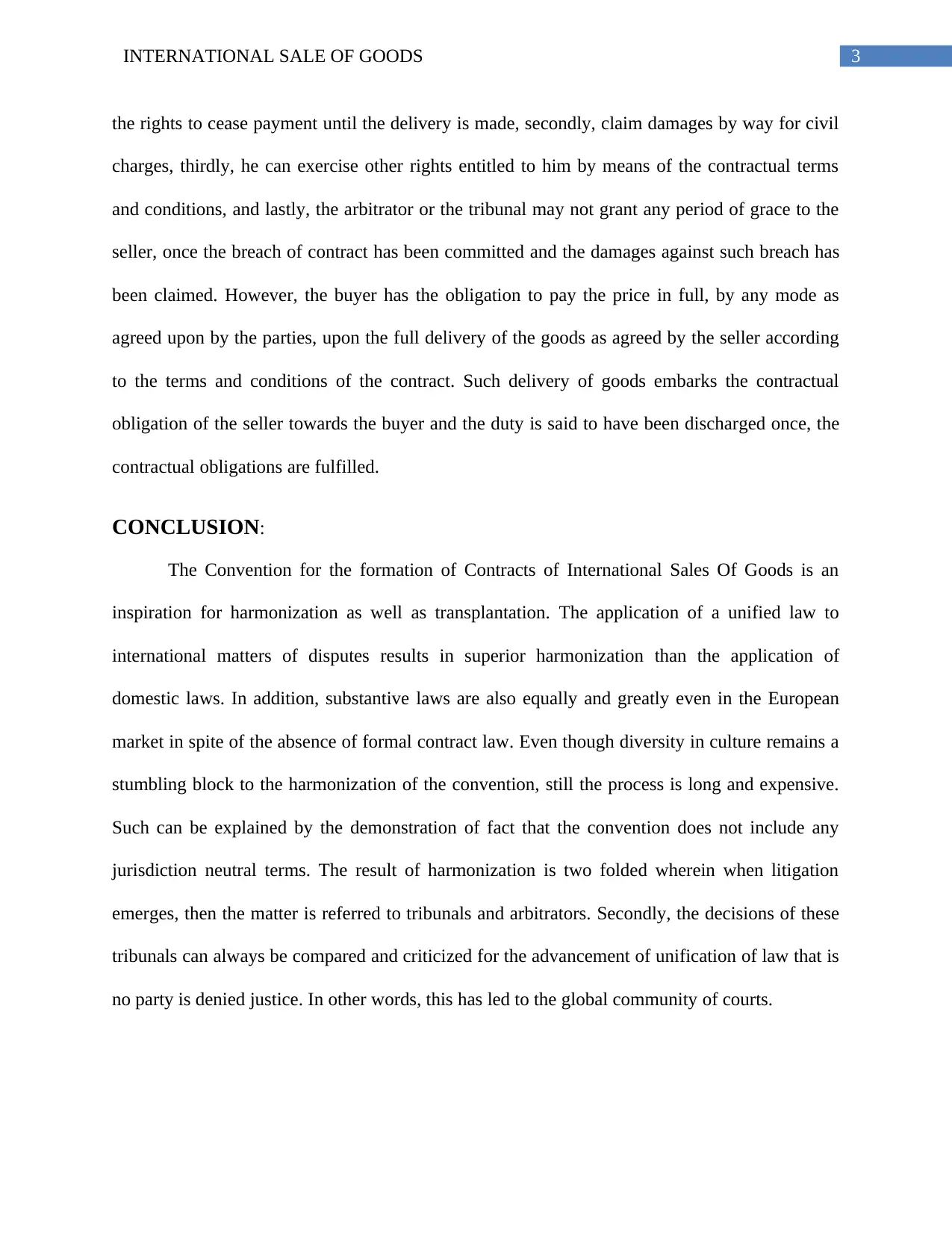
3INTERNATIONAL SALE OF GOODS
the rights to cease payment until the delivery is made, secondly, claim damages by way for civil
charges, thirdly, he can exercise other rights entitled to him by means of the contractual terms
and conditions, and lastly, the arbitrator or the tribunal may not grant any period of grace to the
seller, once the breach of contract has been committed and the damages against such breach has
been claimed. However, the buyer has the obligation to pay the price in full, by any mode as
agreed upon by the parties, upon the full delivery of the goods as agreed by the seller according
to the terms and conditions of the contract. Such delivery of goods embarks the contractual
obligation of the seller towards the buyer and the duty is said to have been discharged once, the
contractual obligations are fulfilled.
CONCLUSION:
The Convention for the formation of Contracts of International Sales Of Goods is an
inspiration for harmonization as well as transplantation. The application of a unified law to
international matters of disputes results in superior harmonization than the application of
domestic laws. In addition, substantive laws are also equally and greatly even in the European
market in spite of the absence of formal contract law. Even though diversity in culture remains a
stumbling block to the harmonization of the convention, still the process is long and expensive.
Such can be explained by the demonstration of fact that the convention does not include any
jurisdiction neutral terms. The result of harmonization is two folded wherein when litigation
emerges, then the matter is referred to tribunals and arbitrators. Secondly, the decisions of these
tribunals can always be compared and criticized for the advancement of unification of law that is
no party is denied justice. In other words, this has led to the global community of courts.
the rights to cease payment until the delivery is made, secondly, claim damages by way for civil
charges, thirdly, he can exercise other rights entitled to him by means of the contractual terms
and conditions, and lastly, the arbitrator or the tribunal may not grant any period of grace to the
seller, once the breach of contract has been committed and the damages against such breach has
been claimed. However, the buyer has the obligation to pay the price in full, by any mode as
agreed upon by the parties, upon the full delivery of the goods as agreed by the seller according
to the terms and conditions of the contract. Such delivery of goods embarks the contractual
obligation of the seller towards the buyer and the duty is said to have been discharged once, the
contractual obligations are fulfilled.
CONCLUSION:
The Convention for the formation of Contracts of International Sales Of Goods is an
inspiration for harmonization as well as transplantation. The application of a unified law to
international matters of disputes results in superior harmonization than the application of
domestic laws. In addition, substantive laws are also equally and greatly even in the European
market in spite of the absence of formal contract law. Even though diversity in culture remains a
stumbling block to the harmonization of the convention, still the process is long and expensive.
Such can be explained by the demonstration of fact that the convention does not include any
jurisdiction neutral terms. The result of harmonization is two folded wherein when litigation
emerges, then the matter is referred to tribunals and arbitrators. Secondly, the decisions of these
tribunals can always be compared and criticized for the advancement of unification of law that is
no party is denied justice. In other words, this has led to the global community of courts.
Paraphrase This Document
Need a fresh take? Get an instant paraphrase of this document with our AI Paraphraser
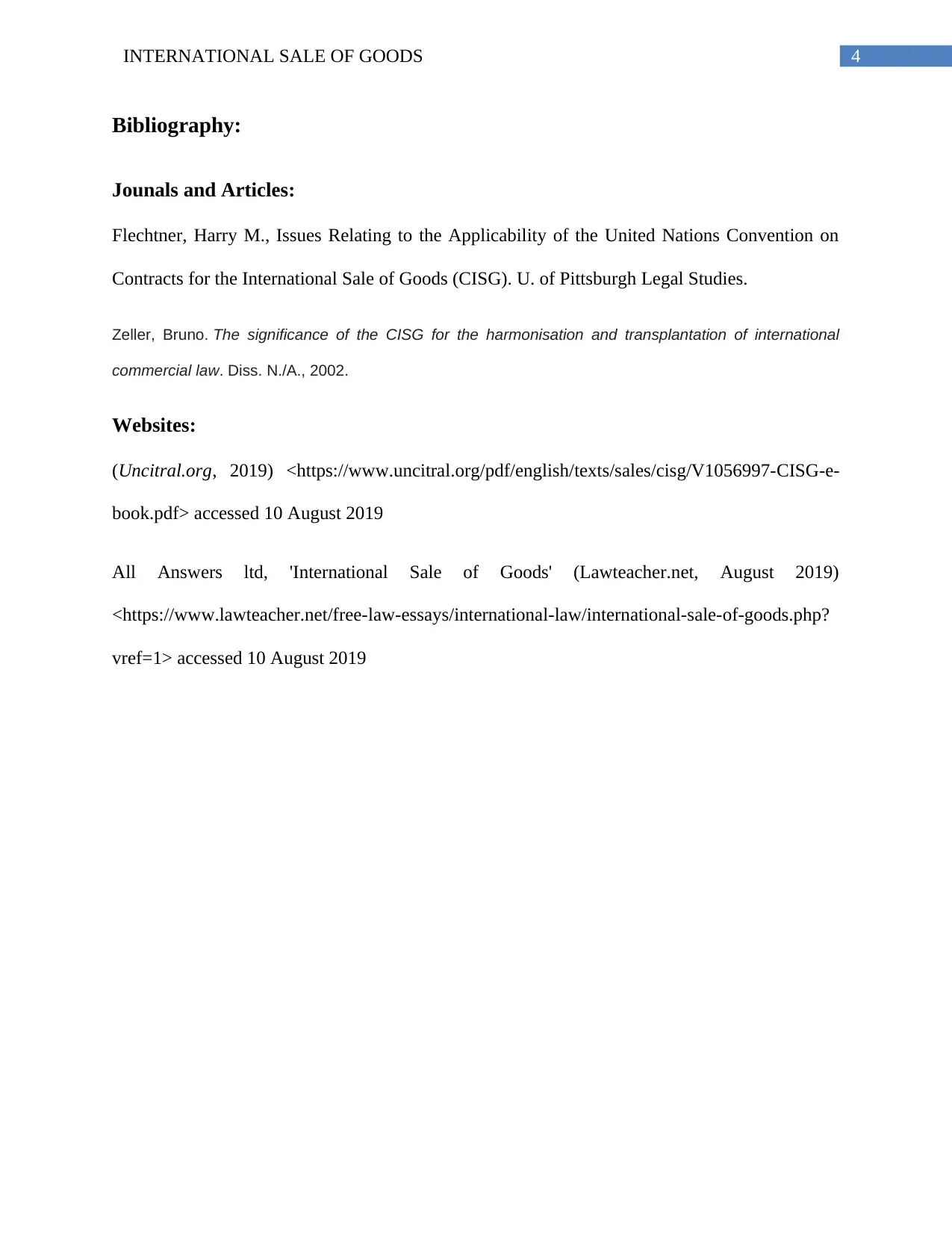
4INTERNATIONAL SALE OF GOODS
Bibliography:
Jounals and Articles:
Flechtner, Harry M., Issues Relating to the Applicability of the United Nations Convention on
Contracts for the International Sale of Goods (CISG). U. of Pittsburgh Legal Studies.
Zeller, Bruno. The significance of the CISG for the harmonisation and transplantation of international
commercial law. Diss. N./A., 2002.
Websites:
(Uncitral.org, 2019) <https://www.uncitral.org/pdf/english/texts/sales/cisg/V1056997-CISG-e-
book.pdf> accessed 10 August 2019
All Answers ltd, 'International Sale of Goods' (Lawteacher.net, August 2019)
<https://www.lawteacher.net/free-law-essays/international-law/international-sale-of-goods.php?
vref=1> accessed 10 August 2019
Bibliography:
Jounals and Articles:
Flechtner, Harry M., Issues Relating to the Applicability of the United Nations Convention on
Contracts for the International Sale of Goods (CISG). U. of Pittsburgh Legal Studies.
Zeller, Bruno. The significance of the CISG for the harmonisation and transplantation of international
commercial law. Diss. N./A., 2002.
Websites:
(Uncitral.org, 2019) <https://www.uncitral.org/pdf/english/texts/sales/cisg/V1056997-CISG-e-
book.pdf> accessed 10 August 2019
All Answers ltd, 'International Sale of Goods' (Lawteacher.net, August 2019)
<https://www.lawteacher.net/free-law-essays/international-law/international-sale-of-goods.php?
vref=1> accessed 10 August 2019
1 out of 5
Related Documents
Your All-in-One AI-Powered Toolkit for Academic Success.
+13062052269
info@desklib.com
Available 24*7 on WhatsApp / Email
![[object Object]](/_next/static/media/star-bottom.7253800d.svg)
Unlock your academic potential
Copyright © 2020–2025 A2Z Services. All Rights Reserved. Developed and managed by ZUCOL.





